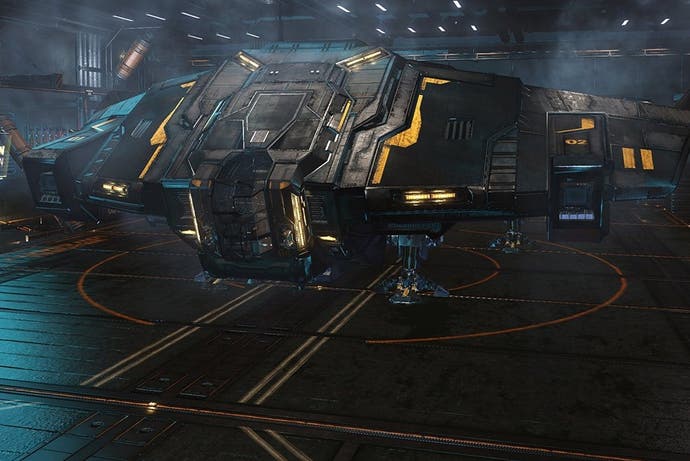Frontier's drive to make Elite: Dangerous on PC future proof
"Moore's law is our friend."
Frontier Developments is aiming to future proof open world space game Elite: Dangerous so it stays relevant for years after launch.
Frontier chief David Braben told Eurogamer that the developer is adding a raft of graphical effects to the game that some players won't have a powerful enough PC to enable. But there are plenty of graphical sliders and checks that should help the game run on a variety of specifications when Elite launches proper before the end of 2014.
"We're going through some wonderful effects internally that look truly beautiful, and we're saying, that slows the frame-rate a bit, doesn't it?" Braben told Eurogamer at the Develop conference last week.
"And we say yes, but we don't mind, because it looks so beautiful. But what we're going to do is attach it to this part of the detail slider. Or we'll call it out as a tick box."
The hope is that with the help of Moore's Law, which predicts that computing power will increase significantly every two years, and ever cheaper prices of graphics cards, Elite will continue to look impressive for years to come.
"Moore's law is our friend," Braben said.
"Even if your PC of today can't run with all the features on, your PC of tomorrow might."
In the current beta build of the game, you can take a screenshot by pressing the F10 button. But if you also hold down the alt button you get a HD screenshot of four times the resolution of what your rendering the game out at. The way it works is the game will briefly go into the high resolution, write out your screenshot, then go back again. This, Braben said, provides a glimpse at the Elite: Dangerous of the future.
"That's great because you start to see the richness," Braben said. "All our models are so detailed. We've got 4K coming now. It pushes today's graphics card to do 4K. I'm not pretending we're there yet. There's 8K in the wings. You can't buy 8K TVs yet, but you can buy 8K cameras. 8K TVs can't be that far away. It's just thinking, actually, that's going to traumatise today's PCs, even the top end workstations with things like Titan Blacks in them. But, that hardware will go on getting better and cheaper.
"And so I love the idea of being pretty future proofed."
Frontier is using its own engine to build Elite: Dangerous, the same one it used to make Xbox One launch title Zoo Tycoon. Around 100 people are working on the game (Frontier is currently 260 people). "This is a big project for us. No messing," Braben said. While there are a couple of smaller games being built elsewhere at the Cambridge-based studio, Elite: Dangerous is its current focus.
Its desire to make the game future proof is in part inspired by the ongoing success of Frontier's RollerCoaster Tycoon 3, which Braben said was the best-selling budget game in the UK last summer, some 10 years after it went on sale.
"One of the reasons I think is it still looks very current," he said, "because we insisted back in 2004 that we support all sorts of ridiculous features that only workstations could support, like pixel shaders, like reflective water, all of those sorts of things.
"And we had a very long detail slider, where if you go all the way to the left you see flat shaded polys, you see water that was just blue, all the way up to things that look really nice, and bump mapping everything. One of the things that's really helped us was we had that huge scalability, so the game could run on the laptop of 2004. It could also run on the uber desktop of 2004. Which is the laptop of today. I want to make sure we do the same with Elite: Dangerous."
There's more to keeping Elite: Dangerous relevant than fancy graphics, of course. The game already supports the Oculus Rift virtual reality headset, which is still in the development phase. And it also supports TrackIR, which is sort of like Oculus without a screen. In the case of Oculus Rift a consumer release looks a long way off, but Frontier reckons there's no harm supporting these kinds of technologies now in case they become essential for video games later.
"We're writing this game for ourselves," Braben said, "and if we think, oh, cool, that's a nice bit of technology, let's try adding it, we will. So long as there's no real block to it. We will see more and more things coming through we will embrace."










